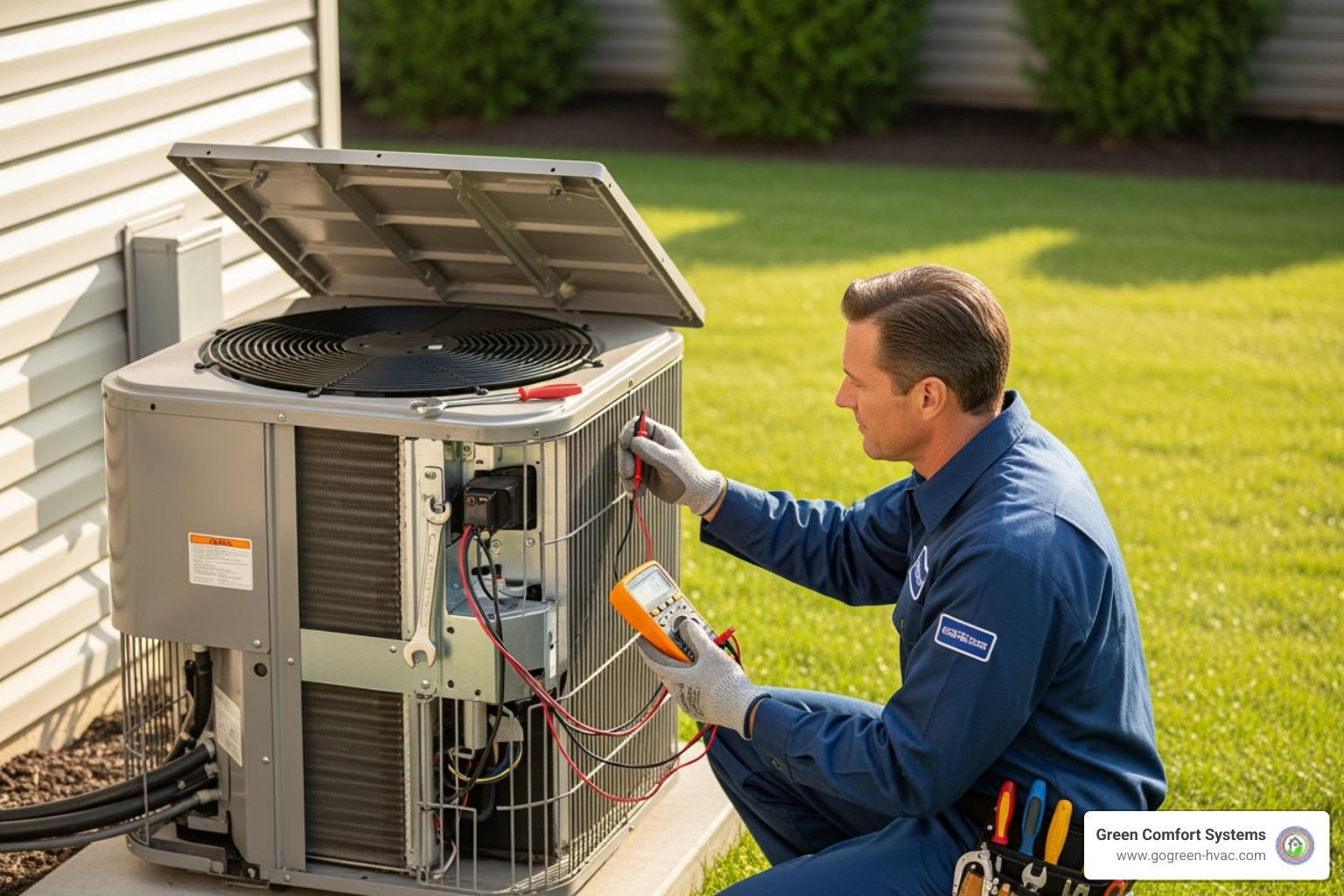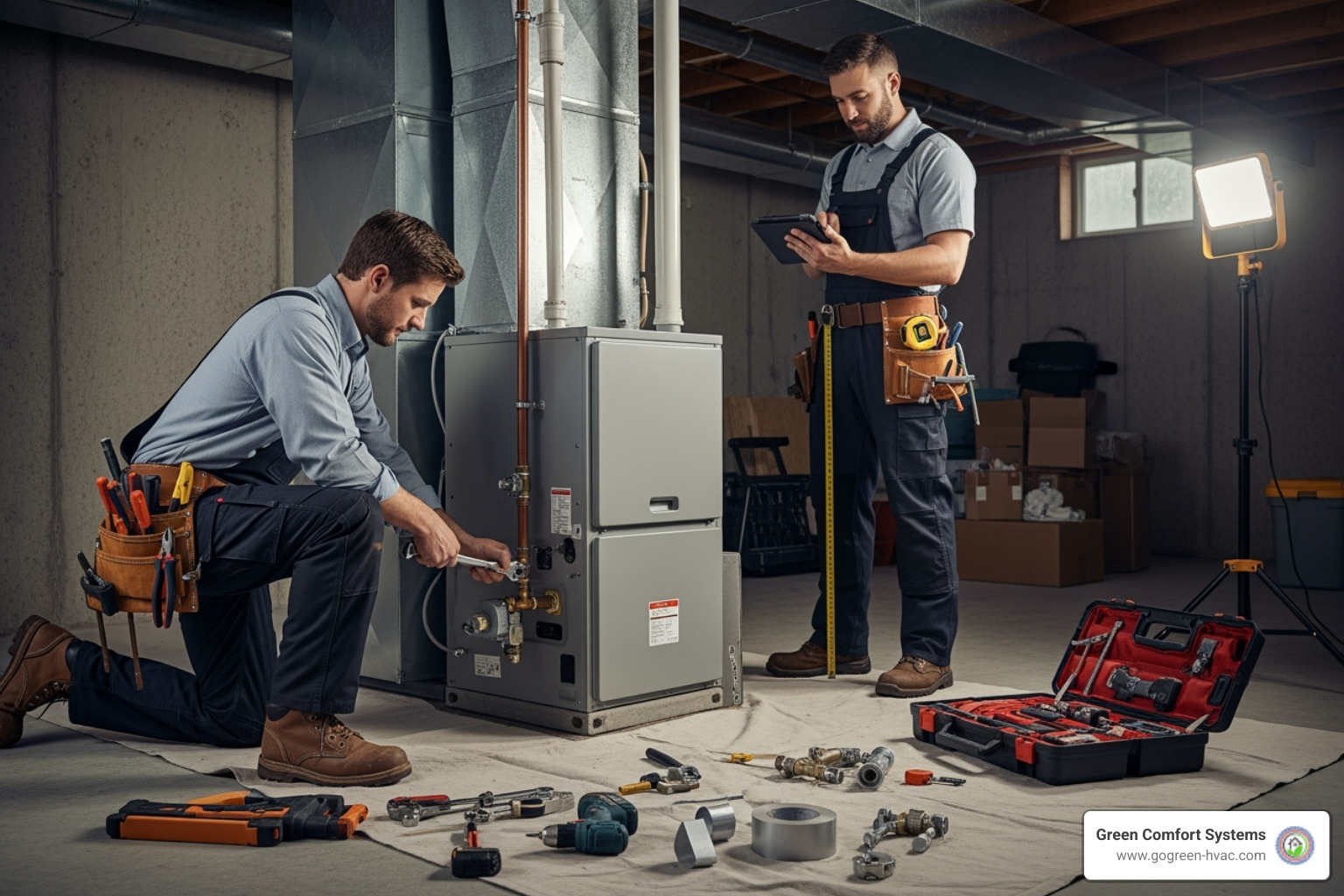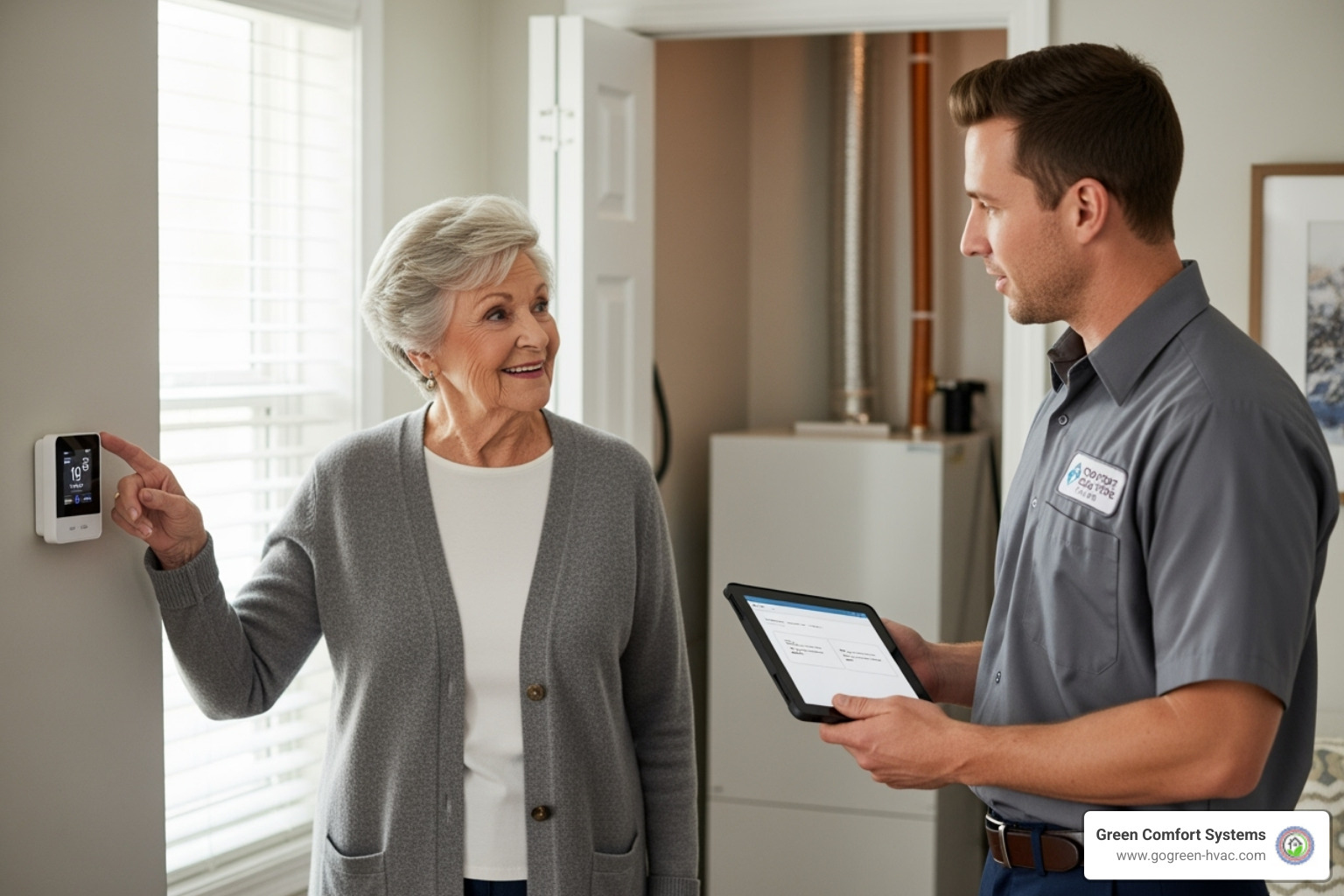The Heat Pump Tune-Up: Your Annual Ticket to Comfort and Efficiency

Why Your Heat Pump Deserves Better Than "Set It and Forget It"
A heat pump tune up is a comprehensive maintenance service that keeps your system running efficiently year-round, typically involving cleaning, inspection, and adjustment of key components like coils, refrigerant levels, and electrical connections.
Quick Heat Pump Tune-Up Overview:
- What it includes: Cleaning coils, checking refrigerant, inspecting electrical connections, testing airflow
- How often: Twice yearly (spring and fall) for year-round systems, once yearly for heating-only use
- Duration: 1.5 to 2 hours on average
- Key benefits: 10-25% energy savings, extended system life, fewer breakdowns
Your heat pump works harder than almost any other appliance in your home. Unlike your furnace that hibernates all summer, your heat pump pulls double duty - cooling your Rosedale home during those sweltering Maryland summers and keeping you warm when winter winds blow.
Think of it like your car. You wouldn't drive 50,000 miles without an oil change, right? Yet many homeowners expect their heat pump to run flawlessly for years without professional attention.
Here's the reality: a well-maintained heat pump uses 10-25% less energy than a neglected one. That's real money back in your pocket every month. More importantly, regular tune-ups can extend your system's life from the typical 8-10 years to 15 years or more.
The difference between a system that serves you reliably and one that leaves you shivering (or sweating) often comes down to one thing: preventive care.
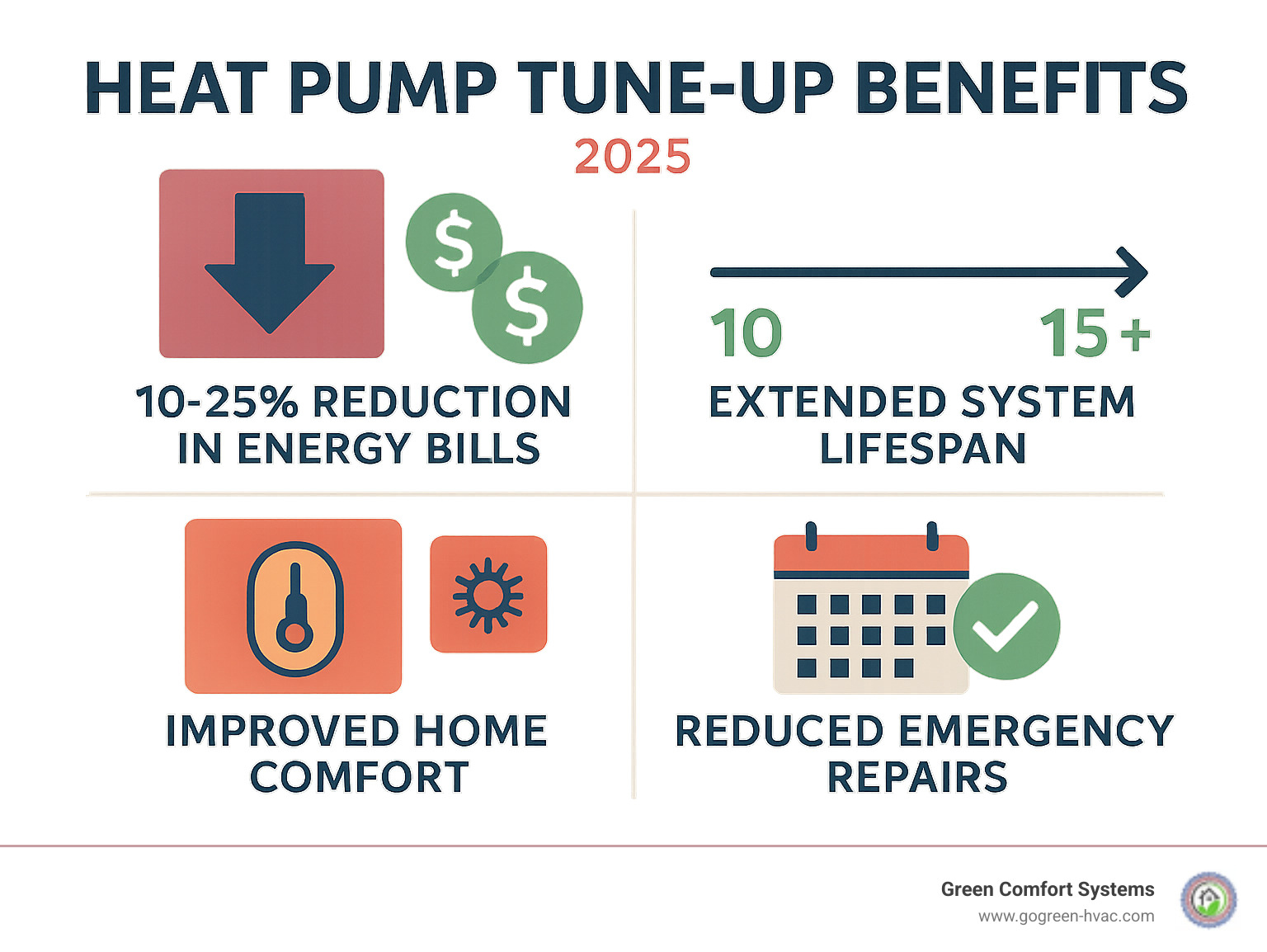
Why Regular Maintenance is Non-Negotiable for Your Heat Pump
Picture this: you're settling in for a cozy evening when your heat pump starts making strange noises, or worse, stops working altogether. It's always during the hottest day of summer or the coldest night of winter, isn't it? This scenario is exactly why regular heat pump tune ups aren't just a nice-to-have service – they're absolutely essential.
Energy efficiency is where you'll see the most immediate impact. A well-maintained heat pump can save you 10-25% on your energy bills compared to a neglected system. That's like getting a permanent discount on your monthly utility costs! Think about it – dust-clogged coils make your system work harder, loose electrical connections create resistance, and dirty filters restrict airflow. All of these issues force your heat pump to consume more electricity to achieve the same comfort level. The NREL report on heat pump benefits emphasizes how proper maintenance open ups the full potential of these efficient systems.
Your heat pump represents a significant investment, and regular maintenance is the key to protecting it. Extended lifespan isn't just a nice bonus – it's the difference between replacing your system in 8-10 years versus enjoying reliable service for 15 years or more. Every month your heat pump operates, components experience wear and tear. Motors need lubrication, electrical connections can loosen, and refrigerant levels may drift. When these small issues go unaddressed, they create a domino effect that puts stress on other parts. Preventing this cascade of problems through regular tune-ups helps you avoid costly breakdowns and maximizes your system's longevity.
Improved home comfort is something you'll notice right away after a professional tune-up. Your heat pump will provide more consistent heating and cooling throughout your home, eliminating those annoying hot and cold spots. A properly maintained system also removes humidity more effectively in summer and distributes warmth evenly in winter. You'll even enjoy better indoor air quality as clean filters and optimized airflow remove more dust and allergens from your home's air. Plus, a well-tuned system operates more quietly, so you won't hear that grinding or squealing that keeps you up at night.
Perhaps most importantly, regular maintenance gives you genuine peace of mind. There's nothing quite like the confidence of knowing your heat pump is ready for whatever Maryland weather throws at it. Whether we're facing a brutal heat wave or an unexpected cold snap, you can rest easy knowing your system won't leave you uncomfortable. Regular tune-ups dramatically reduce the risk of unexpected failures – those emergency breakdowns that always seem to happen at the worst possible times. Your future self will thank you for taking this proactive approach to system care.
The Professional Heat Pump Tune up: A Comprehensive Checklist
So, you understand why regular maintenance is so important. But what exactly happens during a professional heat pump tune up? It's far more than just a quick glance! Our certified technicians at Green Comfort Systems perform a thorough, multi-point inspection and service. We make sure every critical part of your system is working just right. It’s a detailed process that typically takes about one and a half to two hours, depending on your system's condition and if we find any surprises.
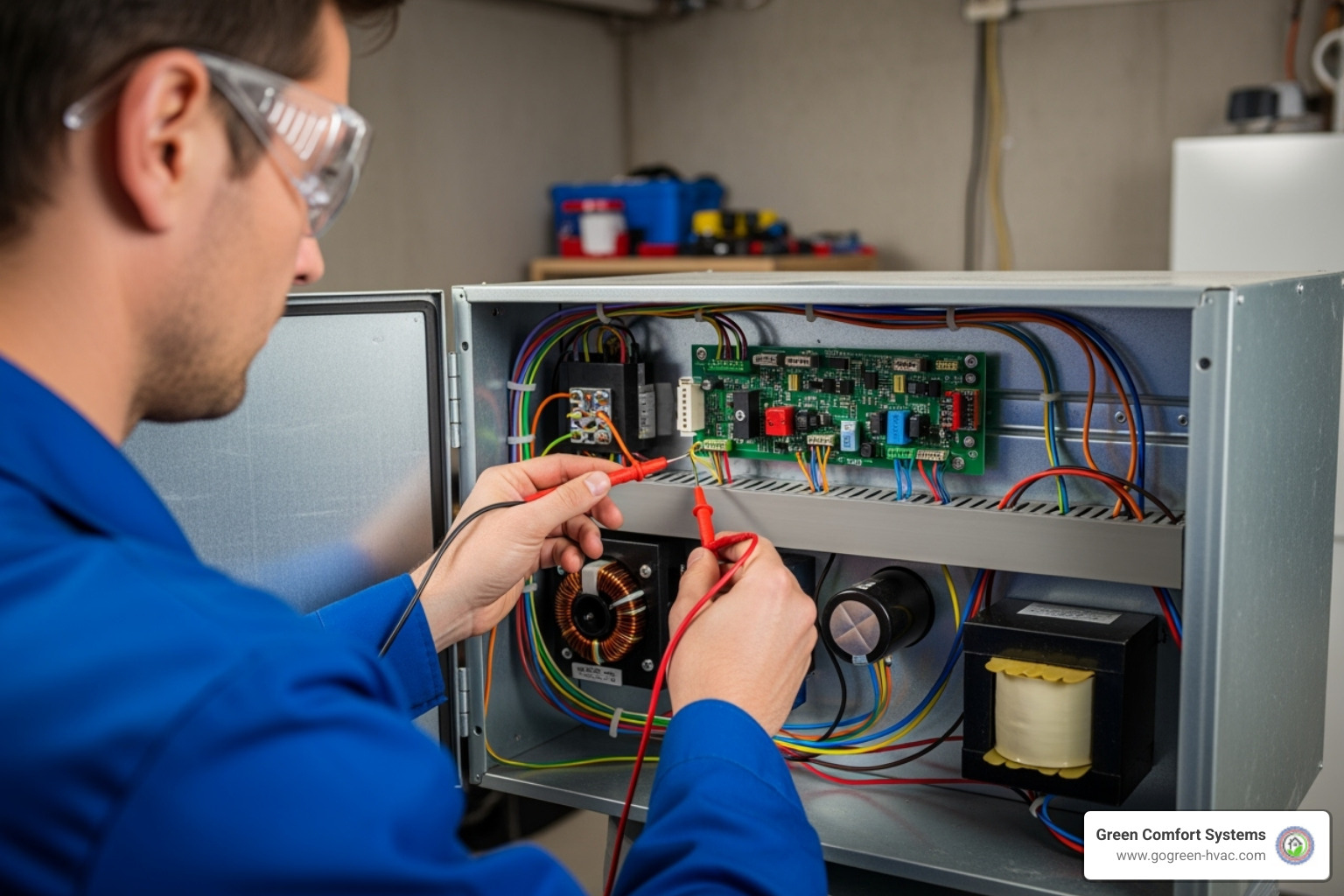
Electrical and Safety Inspection
Your heat pump uses high-voltage electricity, so safety is always our top priority. A big part of any professional tune-up involves a careful check of the electrical system. Our technicians will start by tightening connections. Loose wires can cause power problems, overheating, and even fire risks. We make sure all wiring is super secure.
Next, we check capacitors and relays. Think of these as the spark plugs for your heat pump's motors. We test them to ensure they're sending the right power to get things running smoothly. We also test your heat pump's safety controls. These are the built-in safeguards that protect your system from harm and keep it running safely. We confirm that parts like pressure switches are working perfectly. Finally, we verify your thermostat's calibration. If your thermostat isn't accurate, your heat pump might work harder than it needs to, costing you extra. We check and adjust it to make sure it truly reflects your desired temperature.
Mechanical and Refrigerant Check
The very heart of your heat pump is its mechanical parts and the special liquid called refrigerant. Our expert technicians pay close attention to these vital areas. We start by lubricating motors. Just like a car engine needs oil, moving parts inside your heat pump, like the blower motor, need a little lubrication to prevent friction and wear. This helps your system last longer and run quietly.
If your heat pump has belts (some older models might, though most new ones are direct-drive), we'll inspect belts for wear. We look for any cracks or signs of fraying and suggest replacing them if needed. Worn belts can mean less airflow and wasted energy. Crucially, we verify your refrigerant charge. Refrigerant is like your heat pump's bloodstream; it moves heat around. We carefully check the levels to make sure they're just right. Low refrigerant can make your system super inefficient and put huge stress on the compressor, which is a very expensive part to replace!
If refrigerant levels are low, it usually means there's a leak, because refrigerant isn't used up. So, we'll also be checking for refrigerant leaks. We use special tools to find any leaks and will talk with you about the best way to fix them. Fixing leaks quickly is important, as refrigerant can be harmful to the environment. For more detailed information on key maintenance steps, you can check out resources from the Department of Energy, like their guide on Key steps for maintaining your heat pump.
Airflow and Cleaning
Good airflow and clean components are key to your heat pump working its best. We make sure nothing is stopping your system from moving air and exchanging heat efficiently. We focus on cleaning indoor and outdoor coils. These coils are where your heat pump actually moves heat in and out of your home. The outdoor coil can get dirty with leaves and dust, while the indoor coil can collect pet dander and other airborne stuff. Dirty coils are like wearing a heavy coat in summer – they make your system work much harder and use more energy. We carefully clean both sets of coils to get them back to their best.
As your heat pump cools, it pulls moisture out of the air, creating condensation. We make sure to clear the condensate drain. If this drain gets clogged, you could end up with water leaks, mold, or even a system shutdown. We clean and flush the line to prevent these headaches. We also spend time adjusting blower components. The blower is what pushes air through your home. We check the fan for cleanliness and balance, ensuring it's moving air consistently and quietly. Finally, while a full duct check is a different service, during your tune-up, we'll inspect your ductwork for obvious issues. We look for any clear signs of leaks or damage that could be making your system less efficient.
DIY vs. Professional Service: What You Can Do (and When to Call an Expert)
We believe in empowering homeowners with the knowledge to care for their systems. While a professional heat pump tune up is absolutely essential, there are several simple tasks you can handle between visits. Think of it as a partnership: you take care of the basics, and we handle the technical stuff that requires specialized training and equipment.
It's a bit like maintaining your car. You can check your oil, keep your windshield clean, and make sure your tires have air. But when it comes to rebuilding the transmission? That's when you call the professionals.
| DIY Heat Pump Maintenance Tasks | Professional Heat Pump Tune-Up Tasks |
|---|---|
| Changing air filters | Inspecting electrical connections |
| Cleaning outdoor unit exterior | Testing safety controls |
| Clearing debris around unit | Verifying refrigerant charge |
| Ensuring vents are unblocked | Checking for refrigerant leaks |
| Cleaning indoor registers | Lubricating motors |
| Cleaning indoor/outdoor coils thoroughly | |
| Inspecting belts | |
| Adjusting blower components | |
| Calibrating thermostat | |
| Flushing condensate drain line | |
| Checking for duct leaks |
Your DIY Heat Pump Maintenance Checklist
These simple tasks make a real difference in keeping your system running smoothly between professional visits. The best part? None of them require special tools or technical expertise.
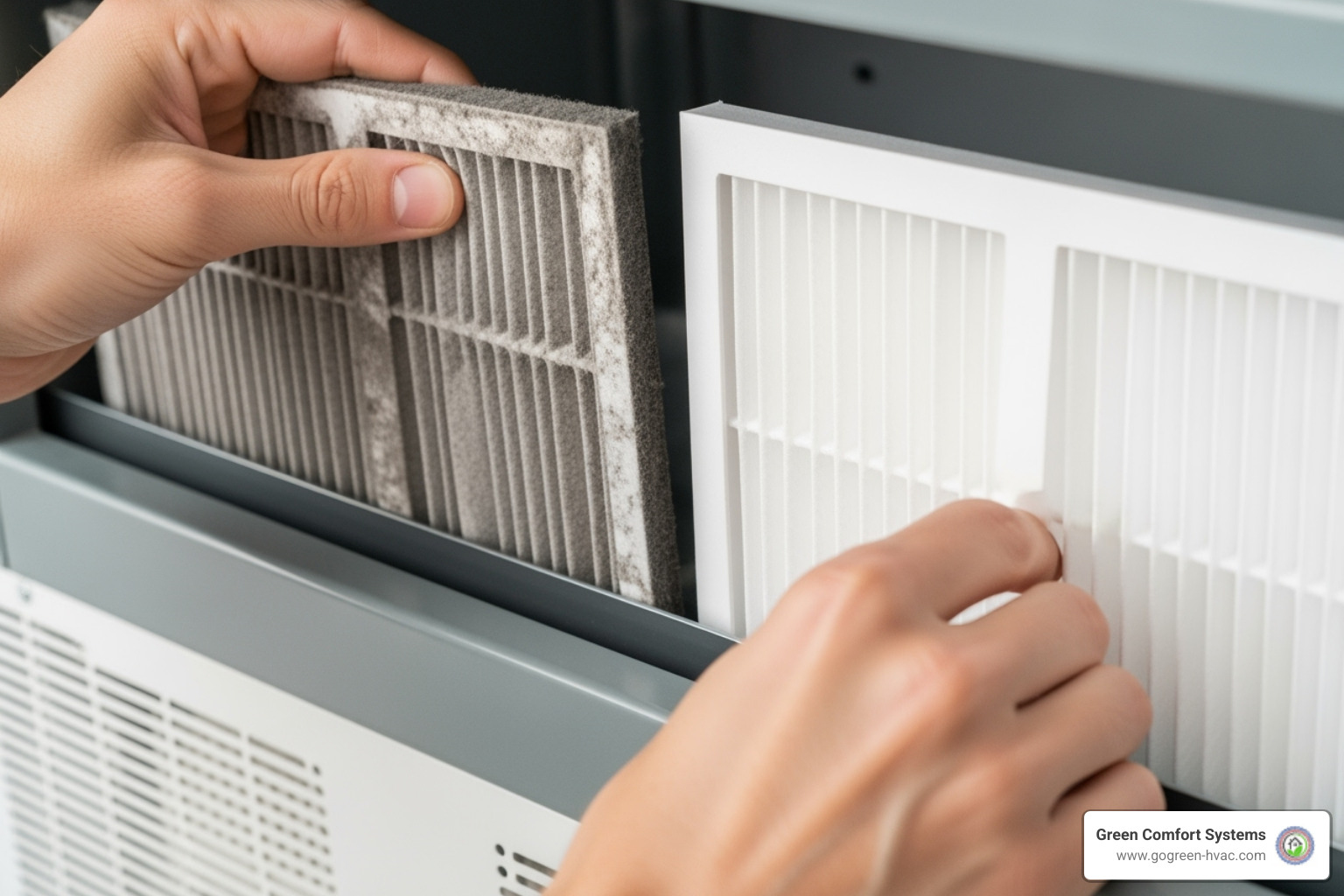
Changing air filters is hands-down the most important thing you can do for your heat pump. A dirty filter is like trying to breathe through a pillow - your system has to work much harder to move air. Check your filter monthly and replace it every 30 to 60 days, depending on your household. Have pets? Allergies? You might need to change it every six weeks.
When shopping for filters, you'll see MERV ratings everywhere. These numbers tell you how well the filter catches particles. Higher numbers mean better filtration, but they can also slow down airflow if your system isn't designed for them. For most homes, a MERV 8-11 filter strikes the right balance. Want to dive deeper into filter options? The EPA has excellent information on Understanding MERV ratings.
Cleaning the outdoor unit is surprisingly straightforward. Your outdoor condenser faces everything Mother Nature throws at it - leaves, grass clippings, cottonwood fluff, and general debris. Walk around your unit regularly and clear away anything that's accumulated on top or around the sides.
Keep at least 2 feet of clearance around the entire unit. This means trimming back bushes, moving stored items, and making sure nothing blocks the airflow. Once a season, with the power turned off, you can gently rinse the outside coils with your garden hose to remove surface dirt. Just remember: gentle is the key word here.
Checking indoor vents takes just a few minutes but makes a big difference. Make sure all your supply and return registers are open and unblocked. We've seen everything from furniture to Christmas decorations blocking vents, which forces your system to work harder and creates uneven temperatures throughout your home.
Take a moment to wipe dust from the grilles when you're doing your regular cleaning. Clean vents mean better airflow and fewer allergens circulating in your home.
Why You Still Need a Professional Heat Pump Tune up
Your DIY efforts are fantastic and genuinely helpful, but they're just the beginning. Professional heat pump tune ups go far beyond what's safe or practical for homeowners to tackle.
Safety risks are the biggest concern. Heat pumps use high-voltage electricity that can seriously injure or kill someone who doesn't know what they're doing. The refrigerant inside your system is under pressure and can cause chemical burns or frostbite. These aren't risks worth taking to save a few dollars.
Specialized tools make all the difference in proper diagnosis and service. Our technicians carry manifold gauges to measure refrigerant pressures precisely, multimeters to test electrical components safely, and leak detectors that can find refrigerant leaks smaller than what you could ever spot visually. Without these tools, it's impossible to know if your system is truly operating correctly.
Most importantly, expert diagnosis is what separates a real tune-up from just cleaning a few parts. Our experienced technicians can spot a failing capacitor, identify early signs of compressor problems, or catch a refrigerant leak before it becomes a major repair. We know what normal looks like for your specific system, so we can identify problems long before they leave you without heating or cooling.
This proactive approach doesn't just keep you comfortable - it protects your warranty and prevents those dreaded emergency service calls that always seem to happen during the worst weather.
Scheduling and Costs: The Practical Guide to Your Tune-Up
Alright, so you're on board with giving your heat pump the VIP treatment it deserves with a regular heat pump tune up. That's fantastic! Now, let's get down to the nitty-gritty: when's the best time to schedule this essential service, and what can you expect regarding the investment?
When and How Often to Schedule Service
Here's the golden rule for your hardworking heat pump: because it's pulling double duty all year long, keeping you cozy in winter and cool in summer, it truly benefits from attention twice a year. We highly recommend scheduling a tune-up in the spring, right before those Maryland temperatures start to climb. This makes sure your system is primed and ready to handle the summer heat efficiently, without breaking a sweat (or your budget!). Then, when the leaves start to turn, we suggest another visit in the fall, preparing your heat pump for the colder months ahead and ensuring reliable warmth all winter.
If, by chance, your home uses a heat pump just for heating (maybe you have a separate AC unit), then a single tune-up in the fall would likely do the trick. But for most folks in areas like Catonsville, Dundalk, or Ellicott City, heat pumps are the go-to for both heating and cooling, making those twice-yearly check-ups truly ideal.
Now, sometimes your heat pump might send out an SOS before your next scheduled tune-up. How do you know if it's crying out for immediate attention? Here are some common signs your heat pump needs a tune-up:
- Your energy bills are suddenly climbing: If you notice your utility bills creeping up, but you haven't changed your usage habits, it's often a sign that your heat pump is working harder than it should be, losing efficiency due to neglected maintenance.
- You hear strange new noises: Grinding, squealing, buzzing, or rattling sounds are definitely red flags. They can point to worn-out parts, loose components, or motor issues that need a professional eye right away.
- The airflow feels weak: If the air coming from your vents just isn't as strong as it once was, it could mean a dirty filter, clogged coils, or a problem with the blower fan.
- It's constantly turning on and off (short cycling): If your heat pump seems to be cycling on and off much more frequently than it used to, it's a clear sign of inefficiency and can put a lot of unnecessary strain on the compressor, which is a very important (and expensive!) part.
- You see ice buildup on the coils: While a little ice on the outdoor coil during winter's defrost cycle is normal, excessive ice that doesn't melt, or any ice on the indoor coil (even in summer!), means there's a serious problem, like low refrigerant or a faulty defrost mechanism.
If you spot any of these signs, don't wait! Give us a call.
Understanding the Cost of a Heat Pump Tune-Up
We totally get it—cost is always a factor when you're thinking about home services. But think of a heat pump tune up not as an expense, but as a smart investment. It's an investment in your family's comfort, your home's energy efficiency, and the long, healthy life of your heat pump. Compared to the potential cost of an unexpected, emergency repair (which always seems to happen on the coldest or hottest day of the year!), or even having to replace your entire system years too soon, a regular tune-up is truly a small price to pay.
The exact cost of a tune-up can vary a bit, as several factors come into play:
- Your system's age and current condition: An older heat pump, or one that hasn't had much love lately, might need a bit more extensive cleaning or minor adjustments, which could take a little longer.
- Your location: Labor rates can vary from one area to another.
- The service provider: Different HVAC companies have their own pricing structures.
Many homeowners find that signing up for one of our maintenance plans is the savviest choice. These plans often include two maintenance visits per year, ensuring your system gets the care it needs, when it needs it. They can also offer discounted rates compared to single-visit services, plus extra perks like priority service and discounts on any necessary repairs. It's a fantastic way to save money in the long run and ensures you never miss a vital tune-up!
Frequently Asked Questions about Heat Pump Maintenance
When it comes to heat pump tune ups, we hear the same concerns from homeowners across Rosedale and the surrounding areas. Let's tackle the questions that keep coming up, so you can make informed decisions about your system's care.
What happens if I skip my heat pump tune-up?
Think of skipping your heat pump tune up like ignoring that check engine light in your car. Everything seems fine today, but you're setting yourself up for bigger headaches down the road.
The first thing you'll notice is your energy bills creeping higher. Without proper maintenance, your system gradually loses efficiency. Those dirty coils we mentioned earlier? They're working overtime, using more electricity to move the same amount of heat. That 10-25% energy penalty adds up fast when you're heating and cooling your home year-round.
Then comes the increased risk of sudden breakdowns. Minor issues that we could easily fix during a routine visit - like a loose wire or slightly low refrigerant - turn into major failures. And Murphy's Law guarantees these breakdowns happen during the worst possible times. Christmas morning with a house full of guests? That's when your neglected heat pump decides to call it quits.
Your system's lifespan takes a hit too. All that extra strain from running inefficiently wears out components faster. Instead of getting 15+ years from your investment, you might find yourself shopping for a replacement after just 8-10 years.
Finally, there's the dreaded expensive emergency repairs. When something breaks unexpectedly, you're looking at emergency service rates and potentially waiting days for parts during peak seasons. A simple tune-up costs a fraction of what you'll spend on emergency repairs.
Can a tune-up fix a frozen heat pump?
This is a great question, and the answer depends on timing. A regular heat pump tune up is fantastic at preventing your system from freezing in the first place. We address the root causes - things like low refrigerant, dirty coils, or a malfunctioning defrost cycle - before they turn into ice problems.
But if you're staring at a heat pump that's already turned into a backyard ice sculpture, a standard tune-up isn't going to solve your immediate problem. A frozen system usually means something specific has gone wrong. Maybe the defrost control board has failed, or there's a significant refrigerant leak, or the reversing valve isn't switching properly.
In that case, you need a repair visit to diagnose the specific fault. Our technicians will figure out what's causing the freeze-up and fix it. Once your system is thawed and running normally again, then we can talk about a tune-up to prevent it from happening again.
How long does a heat pump tune-up take?
Most heat pump tune ups take between 1.5 to 2 hours from start to finish. We're not rushing through a quick checklist - we're methodically going through every component to ensure your system is ready for whatever Mother Nature throws at it.
The exact time can vary based on what we find. If you've been good about changing filters and your system is in great shape, we might finish a bit quicker. But if we find your outdoor coil looks like it's been through a dust storm, or if there are several minor adjustments needed, it might take the full two hours.
The duration depends on the system's condition and the thoroughness of the service we provide. We'd rather take the time to do things right than rush through and miss something important. After all, the whole point is to catch small issues before they become big problems.
When we find minor issues that can be fixed on the spot - like tightening a loose connection or clearing a slightly clogged drain - we'll take care of it during the visit. Bigger problems that require parts or specialized repair work get scheduled for a separate appointment, so you're not waiting around all day.
Conclusion
As we've explored, a regular heat pump tune up is so much more than just crossing an item off your to-do list. It's truly your home's annual VIP pass to ultimate comfort and impressive efficiency. Think of it: you're not just looking after a machine; you're actively securing fantastic energy savings that show up on your monthly bills. You're guaranteeing system longevity, making sure your valuable investment lasts for years and years. And, most importantly, you're ensuring blissful, year-round comfort for everyone under your roof. That's the kind of peace of mind we all deserve, knowing your heat pump is primed and ready, come rain, shine, or snow.
Here at Green Comfort Systems, our commitment goes beyond just keeping you cozy. We're passionate about your comfort, yes, but equally dedicated to caring for our planet. It’s a core part of who we are! That’s why we proudly plant a tree for every service and installation we complete, helping build a greener tomorrow for wonderful communities like Glen Burnie, Halethorpe, and Joppa. We truly believe in providing solutions that make you feel fantastic inside your home and genuinely good about your positive impact on the environment.
So, please, don't let your hardworking heat pump get stuck in the "set it and forget it" cycle. Taking these proactive steps is the best way to protect your home’s comfort system. It ensures your space stays perfectly comfortable throughout every season. Ready to make sure your system is prepped for anything? Ensure your system is ready for every season by scheduling your heat pump installation in Essex, MD today!
Book Expert Service Or Contact Us
Other Blogs





Get Financing Today
Get the comfort you deserve, without the financial stress.

Latest Blogs







